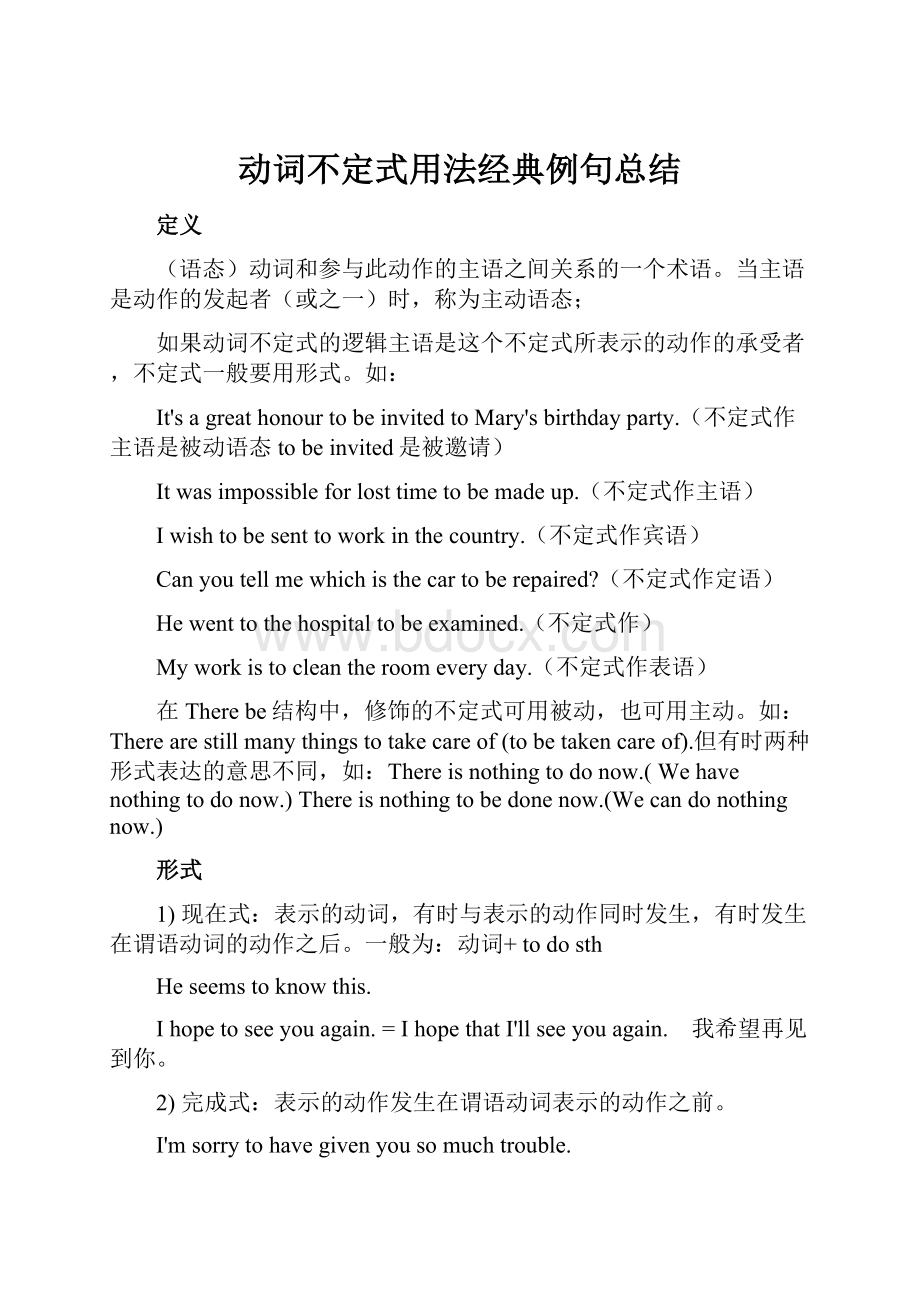动词不定式用法经典例句总结.docx
《动词不定式用法经典例句总结.docx》由会员分享,可在线阅读,更多相关《动词不定式用法经典例句总结.docx(24页珍藏版)》请在冰豆网上搜索。

动词不定式用法经典例句总结
定义
(语态)动词和参与此动作的主语之间关系的一个术语。
当主语是动作的发起者(或之一)时,称为主动语态;
如果动词不定式的逻辑主语是这个不定式所表示的动作的承受者,不定式一般要用形式。
如:
It'sagreathonourtobeinvitedtoMary'sbirthdayparty.(不定式作主语是被动语态tobeinvited是被邀请)
Itwasimpossibleforlosttimetobemadeup.(不定式作主语)
Iwishtobesenttoworkinthecountry.(不定式作宾语)
Canyoutellmewhichisthecartoberepaired?
(不定式作定语)
Hewenttothehospitaltobeexamined.(不定式作)
Myworkistocleantheroomeveryday.(不定式作表语)
在Therebe结构中,修饰的不定式可用被动,也可用主动。
如:
Therearestillmanythingstotakecareof(tobetakencareof).但有时两种形式表达的意思不同,如:
Thereisnothingtodonow.(Wehavenothingtodonow.)Thereisnothingtobedonenow.(Wecandonothingnow.)
形式
1)现在式:
表示的动词,有时与表示的动作同时发生,有时发生在谓语动词的动作之后。
一般为:
动词+todosth
Heseemstoknowthis.
Ihopetoseeyouagain.=IhopethatI'llseeyouagain. 我希望再见到你。
2)完成式:
表示的动作发生在谓语动词表示的动作之前。
I'msorrytohavegivenyousomuchtrouble.
Heseemstohavecaughtacold.
3):
表示动作正在进行,与谓语动词表示的动作同时发生。
Heseemstobeeatingsomething.
4)完成进行式:
Sheisknowntohavebeenwreakingontheproblemformanyyears.
一般在表示情绪的动词后加todo也表将来
疑问词
who,what,which,when,where,whether,how后可接不定式构成,在句中作主语、宾语、表语等。
如:
①WhentoleaveforLondonhasnotbeendecidedyet.(不定式在句子中做主语)
②Mr.Smithdidn'tknowwhethertoleaveorstaythere.(不定式在句子中做宾语)
③IaskedProfessorXuhowtolearnEnglishwell.(不定式在句子中做)
④Thequestionwaswheretogetthemedicineneeded.(不定式在句子中)
以上例句中+不定式部分,均可转换为相应的形式。
如:
①Whenweshallleave…③…howI
couldlearn……
经常在这种结构中使用的动词有:
consider,decide,discover,explain,findout,forget,hear,know,learn,observe,understand,wonder等。
作主语
动词不定式作主语时,句子的谓语动词常用,其位置有以下两种:
(1)把不定式置于句首。
如:
Togettherebybikewilltakeushalfanhour.骑自行车到那儿将花费我们半个小时。
Tomakeupforlosttimeisnotpossible.要弥补失去的时光是不可能的。
Toleanoutofthewindowisdangerous.身子探出窗外很危险。
Tosavemoneynowseemsimpossible.现在好像不可能存钱。
(2)用it作,把真正的主语不定式置于句后,常用于下列句式中。
如:
①It+be+名词+todo
It'sourdutytotakegoodcareoftheold.照顾老人是我们的责任。
Itisanoffencetodroplitterinthestreet.在马路上乱丢废物是违章的。
②Ittakessb+sometime+todo
Howlongdidittakeyoutofinishthework?
你花了多少时间来完成这项工作?
③It+be+形容词+forsb+todo
Itisdifficultforustofinishwritingthecompositioninaquarterofanhour.我们难以在四分之一小时内完成这篇作文。
Itisstupidofyoutowritedowneverything(that)theteachersays.你把老师说的所有东西都记下来的行为是很愚蠢的。
④Itseems(appears)+形容词+todo
Itseemedimpossibletosavemoney.
在句型③中,常用表示客观情况的形容词,如:
difficult,easy,hard,important,impossible,necessary等;在句型④中,常用careless,clever,good,foolish,honest,kind,lazy,nice,right,silly,stupid,wise等表示赞扬或批评的词。
在不定式前的sb,可看作其逻辑主语。
这一句式有时相当于Sbis+形容词+todo句式,如:
It'skindofyoutohelpmewithmyEnglish.=YouarekindtohelpmewithmyEnglish.
⑤It+不定式结构可位于believe/consider/discover/expect/find/think和wonder之后
Hethoughtitwouldbesafertogobytrain.他认为乘火车比较安全。
Hewillfinditishardtomakefriends.他会感觉到交朋友困难。
⑥不定式的完成式也可作句子的主语
Tohavemadethesamemistaketwicewasunforgivable.两次犯同样的错误是不可原谅的。
Itisbettertohavelovedandlostthannevertohavelovedatall.爱过而后失去了爱,比从未爱过要好。
(3)举例
(1)It'seasy(forme)todothat.我做这事太容易了
easy, difficult, hard, important, possible, impossible, comfortable, necessary, better;
thefirst, thenext, thelast, thebest, toomuch, toolittle, notenough
It'ssonicetohearyourvoice.听到你的声音真高兴。
It'snecessaryforyoutolockthecarwhenyoudonotuseit.当你不用车的时候,锁车是有必要的。
(2)It'sverykindofhimtohelpus. 他帮助我们,他真好。
Kind, nice, stupid, rude, clever, foolish, thoughtful, thoughtless, brave, considerate(考虑周到的), silly, selfish(自私的)
例句:
Itwassillyofustobelievehim. 我们真愚蠢,竟然相信了他。
Itseemedselfishofhimnottogivethemanything. 他不给他们任何东西,这显得太自私了。
注意:
(1)其他如,look,appear等也可用于此句型
(2)不定式作为时,动词用形式。
(3)当不定式作主语的句子中又有一个不定式作时,不能用Itis…to…的句型
(对)Toseeistobelieve. 眼见为实。
(错)Itistobelievetosee.
作宾语
1)以下动词后,只能跟不定式作
(付得起),(同意),aim(力求做到),(显得),(安排),(要求),attempt(试图),care(想要),choose(决定),claim(声称),condescend(屈尊),consent(准许),decide(决定),demand(要求),determine(决心),endeavor(竭力),expect(期待),fail(未履行),help(帮助),hesitate(犹豫),hope(希望),learn(学会),manage(设法),neglect(疏忽),offer(主动提出),plan(计划),prepare(准备),pretend(假装),proceed(接着做),promise(答应),prove(证明),refuse(拒绝),resolve(解决),seem(觉得好像),swear(发誓),tend(往往会),threaten(预示),undertake(承诺),volunteer(自愿做),vow(发誓),want(想要),wish(希望)
举例:
Thedriverfailedtoseetheothercarintime.
司机没能及时看见另一辆车。
Ihappentoknowtheanswertoyourquestion.
我碰巧知道你那道问题的答案。
2)动词++
decide,know,considerforget,learn,remember,show,understand,see,wonder,hear,findout,explain,tell
Pleaseshowushowtodothat.请演示给我们如何去做。
Therearesomanykindsoftape-recordersonsalethatIcan'tmakeupmymindwhichtobuy.有这么多的录音机,我都拿不定主意买哪一种。
注意:
带不定式在句中作成分时,谓语动词用。
Thequestionishowtoputitintopractice.
问题是怎样把它付诸实施。
3)当中的宾语是不定式时,先用it代替不定式,把不定式置于之后,即:
主语+动词+it+补语+todo句式。
如:
Wethinkitquiteimportantforustolearnaforeignlanguagewell.
Hefeelsithisdutytohelpthepoor.
IfinditdifficulttolearnEnglishwell.
作补语
1)动词+宾语+不定式(todo)
常见动词:
advise,allow,believe,cause,challenge,compel,declare,encourage,forbid,force, find,hire,induce,instruct,invite,like,order,permit,persuade,remind,request,require,select,send,suppose,tell,train,urge
例句:
a. Fatherwillnotallowustoplayonthestreet.
父亲不让我们在街上玩耍。
b. Webelievehimtobeguilty.
我们相信他是有罪的。
2)to+be的不定式结构,作的动词。
常见动词:
Acknowledge, believe, consider, think, declare(声称), discover,fancy(设想), feel, find, guess, judge, imagine, know, prove, see(理解),show, suppose, take(以为), understand
WeconsiderTomtobeoneofthebeststudentsinourclass.
我们认为汤姆是班上最好的学生之一。
3)tobe+形容词
常见动词:
Seem, appear, besaid, besupposed, bebelieved, bethought, beknown, bereported, hope,wish, desire, want, plan, expect, mean…
Thebookisbelievedtobeuninteresting.
人们认为这本书没什么意思。
4) therebe+不定式
常见动词:
believe,expect,intend,like,love,mean,prefer,want,wish,undrstand
Wedidn'texpecttheretobesomanypeoplethere.我们没料到会有那么多人在哪里。
有些动词需用as短语做,如regard,thinkbelieve,take,consider.
WeregardTomasourbestteacher. 我们认为汤姆是我们最好的老师。
Marytookhimasherfather. 玛丽把他当作自己的父亲。
5)秃头不定式作
秃头不定式,即不带“to”的不定式,其语法功能一般在句子中作宾语的()。
用秃头不定式作宾语补足语的常用动词如下:
口诀:
“五看、三使役“,“两听、一感”要记住,若是“宾补”变“主补”,主补“to”字不能无。
动词let属例外,其宾补/主补“to”均无。
说明:
五看-----see/watch/notice/observe/lookat;三使役-----have/make/let;两听-----hear/listento;一感-----feel。
例句:
Ioftenseehimgotoschoolonfoot.(秃头不定式作)Heisoftenseentogotoschoolonfoot.(不定式作主语补足语,要带“to”)Lethimtryagain.----Heislettryagain.(let的主补与宾补均用秃头不定式)
Find特殊用法
后可用做宾补,或先加,再加形容词,最后加带to的动词不定式。
find后也可带一个从句。
此类动词还有get,have。
Ifoundhimlyingontheground.
Ifounditimportanttolearn.
IfoundthattolearnEnglishisimportant.
作表语
不定式作表语表示具体动作或将来动作;动名词作表语表示抽象的一般行为。
①Tobekindtotheenemyistobecrueltothepeople.
②Mychiefpurposeistopointoutthedifficultiesofthematter.
③WhatIwouldsuggestistoputoffthemeeting.
当主语和表语都是不定式时,其含义一是条件,一是结果(例①)。
当主语是aim,duty,hope,idea,mistake,plan,purpose,suggestion等为中心词的名词词组(例②)时,或以what引导的名词性分句(例③),不定式说明主语的内容。
④Ourworkisservingthepeople.
⑤Whathelikesistakingawalkaftersupper.
⑥ThestorytoldbyMr.Wangisinteresting.
④⑤句动名词作表语,与主语部分可以转换,如Servingthepeopleisourwork,而⑥句中是作表语,说明主语的性质、状态,现在分词具有形容词的各种特征,另外,动名词作表语还应与进行区别开来。
作状语
(1)目的
To…onlyto(仅仅为了), inorderto, soasto, so(such)…asto…(如此……以便……)
Heransofastastocatchthefirstbus. 他飞快地跑以便赶上第一班车。
Icomehereonlytosaygood-byetoyou. 我来仅仅是向你告别。
(2)作结果状语,表事先没有预料到的,要放在句子后面。
WhathaveIsaidtomakeyouangry.
Hesearchedtheroomonlytofindnothing.
(3) 表原因
I'mgladtoseeyou.
典型例题
Thechairlooksratherhard,butinfactitisverycomfortableto___.
A.sit B.siton C.beseat D.besaton
答案:
B. 如果不定式为,其后应有必要的介词。
当动词与介词连用时,常位于“形容词+动词不定式”结构的末尾。
作定语
⒈不定式作定语
不定式在句中作定语,置于被修饰的名词或之后。
如:
①ThenexttraintoarriveisfromWashington.
②Doyouhaveanythingtobetakentoyoursister?
③Doyouhaveanythingtosayonthequestion?
④Wouldyoupleasegivemesomepapertowriteon?
⑤MywishtovisitFrancehascometrueatlast.
作定语和被修饰词之间表示以下关系:
(1)表示将来的动作(例①)。
(2)与被修饰词之间有,如是不,则需加(例④)。
(3)与被修饰词之间有动宾关系,同时与句中其它词之间又有逻辑上的主谓关系时,尽管有被动含义,却仍用(例③);如只有动宾关系,而无逻辑上的主谓关系,则需用(例②)。
(4)不定式作定语时,一般可转换为定语,例①toarrive=thatwillarrive。
相关省略
(1)(除ought外,oughtto意思是“应该”,是情态动词,只有一种形式,后边接动词不定式,to不能省略。
oughtto没有人称和数的变化,后接可以表示现在、将来或过去将来,由或上下文决定。
例如:
Theyoughttocometomorrow.他们明天应当来):
(2)let,have,make:
(3)see,watch,lookat,notice,observe,hear,listento,smell,feel,find等后作宾补,省略to。
注意:
在中则to不能省掉。
在中get除外(getsb.todosth.)
Isawhimdance.
=Hewasseentodance.
Thebossmadethemworkthewholenight.
=Theyweremadetoworkthewholenight.
(4)表示个人意愿或倾向的wouldrather,hadbetter,might(just)aswell:
ratherthan置于句首时。
Ratherthanrideonacrowdedbus,healwayspreferstorideabike.
(5)Why…/whynot…:
(6)help可带to,也可不带to,helpsb(to)dosth:
(7)but和except:
but前是动词do时,后面出现的动词用不带to的动词不定式。
(8)由and,or和than连接的两个不定式,第二个to可以省去:
(9)通常在discover,imagine,suppose,think,understand等词后,可以省去tobe:
Heissupposed(tobe)nice. 他应该是个好人。
(10)but作,后接不定式结构时,前面谓语动词部分若含有do的形式时,but后的不定式要省去to,否则要带to。
Hewantstodonothingbutgoout.
Hewantstobelieveanythingbuttotakethemedicine.
(11)当两个或多个不定时短语由and,but或or连接时,后一个或几个不定式符号to常省略。
但若表示对比、对照关系时,则不能省略。
HewantstomovetoFranceandmarrythegirl.
Thepurposeofnewtechnologiesistomakelifeeasier,nottomakeitmoredifficult.
(12)不定式做表语时,一般要带to,但若主语部分中含有do的各种形式时,符号to可省去。
We'vemissedthelastbus.Allwecoulddonowiswalkhome.
否定式
Tellhimnottoshutthewindow…
ShepretendednottoseemewhenIpassedby.我走过的时候,她假装没看见。
特殊句型
soasto
(1)表示目的;它的否定式是soasnottodo。
Tomkeptquietabouttheaccidentsoasnottolosehisjob.汤姆对事故保持沉默是为了不丢掉他的工作。
Goinquietlysoasnottowakethebaby.轻点进去,别惊醒了婴儿。
(2) sokindasto——劳驾
Wouldyoubesokindastotellmethetime?